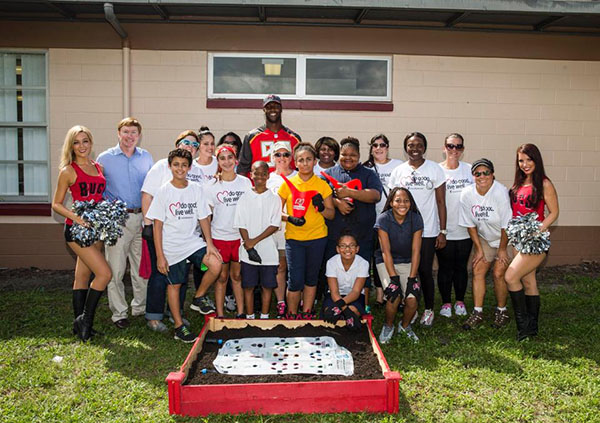
Share On Social!
In Florida, access to healthy food may be greater than 10 miles for some families.
In addition to not getting healthy options at home, many at-risk kids do not get the opportunity to learn about where fresh food comes from or how it is grown.
Hoping to help to fight hunger and obesity through educating kids about the value of eating fruits and vegetables, local UnitedHealthcare employee volunteers teamed up with the Tampa Bay Buccaneers NFL football team to build and donate learning gardens to local Florida schools.
Healthy Food Access in Tampa, Florida
The population of Tampa, Fla., (23.1% Latino) and its county seat, Hillsborough County, Fla., (26% Latino) have had an influx of Latino families moving to the area since 2013, according to Tampa General Hospital’s 2013 Community Health Needs Assessment.
Unfortunately, 66.1% of Latino adults are overweight and low-income preschools had high rates of obesity (17%) in the Tampa area, according to HealthyTampaBay.com.
Fifty percent of students in the Tampa area are eligible for the Free Lunch Program (FLP) under the National School Lunch Program (NSLP) and receive healthy school meal options.
However, many children in the area are still in the danger, or red zone compared to other U.S. counties when it comes to having access to healthy foods.
Healthy changes were clearly needed.
In fact, Shannon Loecher, the director of social responsibility for UnitedHealthcare, learned from its local providers—the company has a network of 255 hospitals and other health facilities and more than 42,000 physicians and other care providers in Florida—that they wanted to increase efforts to drive healthy changes in the community in Tampa.
“A lot of people had indicated that Tampa was an important spot,” Loecher said.
Loecher said UnitedHealthcare has a strong employee volunteer program, “Do Good. Live Well.” (DGLW), which works to decrease hunger and obesity and inspire service and volunteerism.
The program employees wanted to focus on the Tampa area.
“Tampa just happens to fall into all the categories, where we’ve got employees that can volunteer, needs in hunger and obesity, and business needs.”
But how would they make an impact on local obesity?
Partnering with the Tampa Bay Buccaneers on Healthy Food Action
To get started on a change, UnitedHealthcare and its employee volunteers engaged the NFL’s Tampa Bay Buccaneers, a community partner they’ve worked with since 2011.
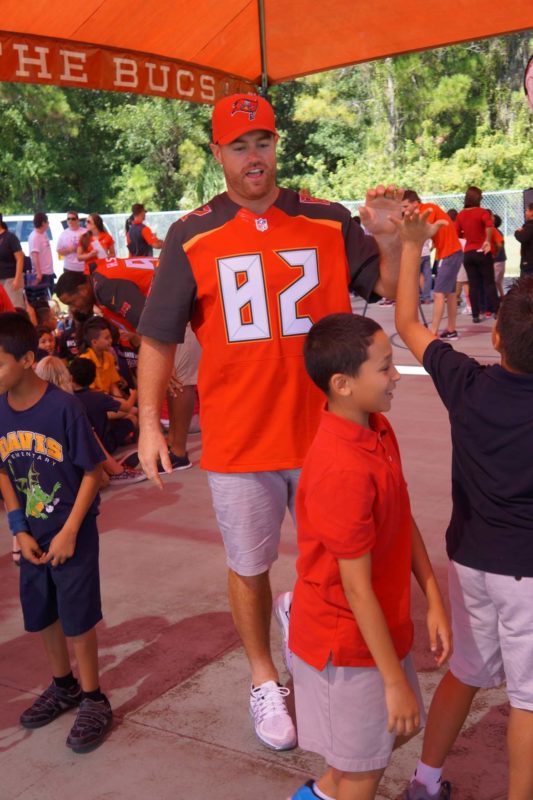
The football organization runs the Buccaneers Academies initiative, an educational effort that offers more than 12,000 students in Tampa-area schools incentive-based programs and monthly challenges that provide fun, engaging and motivating opportunities to learn.
“We are trying to build healthy communities, and working with the Bucs, we have some shared goals and objectives,” said Loecher.
Together they discussed how to address obesity and hunger through learning gardens.
Learning gardens are produce gardens that enable students to help plant and nurture a garden, and learn about and sample new fruits and vegetables
After Google-searching more about school gardens, they decided to make multiple interactive gardens where students can learn about both produce and nutrition at each school where the Buccaneers already had relationships through its Buccaneers Academy. They wanted something that would be easy for volunteers to put together and deliver to the schools.
“[The Bucs] had a plan, where DGLW could do a number of gardens in a number of schools, which would benefit the Bucs’ schools and help promote both the Bucs and the DGLW mission of health throughout the Tampa Bay community,” Loecher said.
The Bucs’ organization reached out to their partner schools to get support for the gardens.
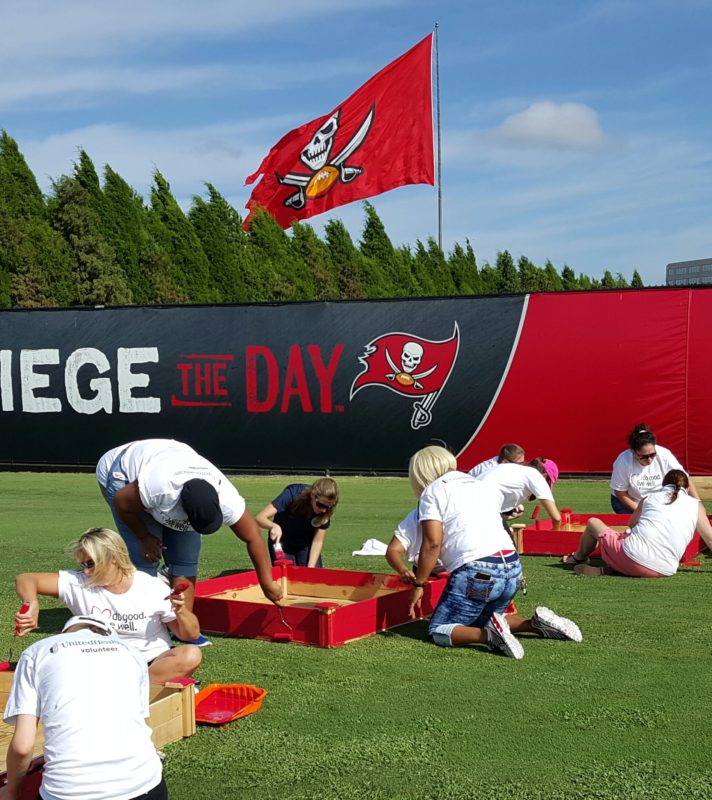
A Day of Planting Gardens with the Bucs
Loecher and the UnitedHealth employee group used their volunteer email communication system for describing project details and recruiting interested Tampa-area employees for a day to build the gardens.
On Sept. 15, 2014, Buccaneers players and 75 UnitedHealthcare employee volunteers (under the DGLW program) gathered at the Bucs’ practice facility to construct the learning gardens that were to be installed in the Bucs’ partner schools.
With the learning gardens built and dirt ready, delivery to and set up in schools was the next step.
Volunteers from both the employee volunteer group and the Bucs planned to start setting up and planting gardens at each of Tampa’s local title one schools (those that get supplemental funding due to large concentrations of low-income students).
Each learning garden then would become part of the Buccaneers Academies’ curriculum.
Then the gardens would be havens to introduce students how to plant and nurture herbs and vegetables while also learning how to have a healthy diet through discovering fresh produce.
“The ‘Learning Gardens’ program will provide each participating Buccaneers Academies school with a growing classroom that can be used to demonstrate healthy food choices and leave a lasting, positive impact on children,” said Darcie Glazer Kassewitz, co-president of the Glazer Family Foundation, in a recent article.
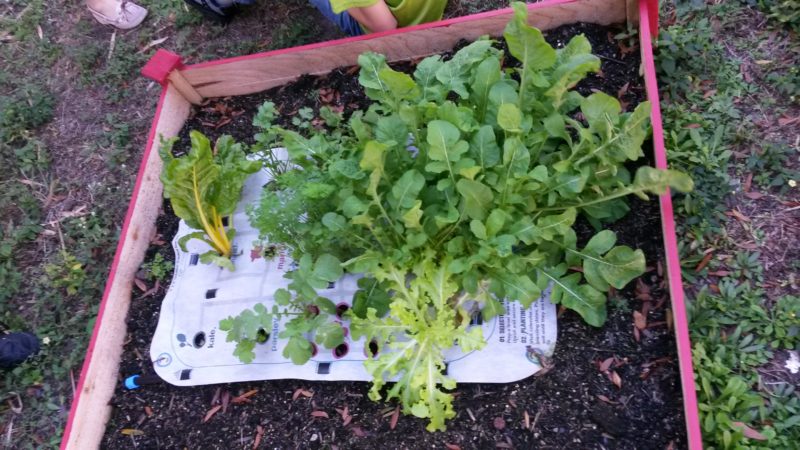
On Sept. 29, 2014, 35 learning gardens were planted on school grounds of seven Buccaneers Academy schools: Potter Elementary, Edison Elementary, Foster Elementary, Graham Elementary, LaVoy Exceptional Center, Sheehy Elementary, and Sulphur Springs Elementary.
“We are grateful for the opportunity to partner with the Buccaneers to help Florida school children learn more about healthy foods, and improve their health and well-being,” said T. David Lewis, CEO of UnitedHealthcare of Central North Florida, in a recent article.
Students Use the Gardens to Grow Healthy Food
At the setup of the first learning gardens, students interacted with Bucs players and UnitedHealthcare employee volunteers (from the DGLW program) as they and teachers planted the gardens.
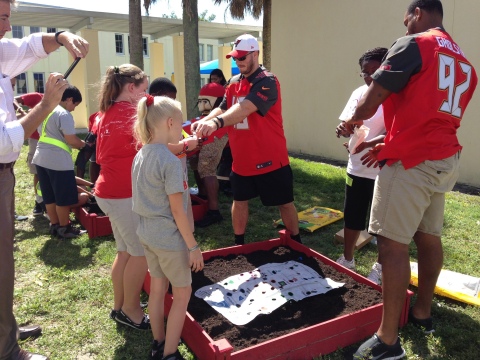
Maps showing which seed was planted in what area of the garden were also given to each school to help students remember what they planted and how the plant would look as it grew over time. The garden maps displayed a variety of vegetables including, chard, carrots, spinach, arugula and tomato and herbs like marigold, cilantro, and basil.
In 2015, more Buccaneers Academies schools received gardens, including Cleveland, Davis, Kenly, Mort, Tampa Bay Boulevard, and Twin Lakes elementary schools, and Winthrop Charter School.
Staff from the Florida Department of Agriculture and Fresh Florida Kids also helped in 2015 by providing collateral materials to students on the day of the garden deliveries to encourage kids to learn about eating healthy, planting, and harvesting. Schools also could partner up with Fresh for Florida Kids in 2015 to have their staff come and continually teach the students about vegetables, produce and nutrition throughout the school year.
Some of the teachers from Mort Elementary (54.77% Latino), 1st-grade teachers Amy Ramirez and Amber Mueller, the science resource teacher, took initiative in 2015 by taking gardening classes before their gardens were donated.
Mort Elementary’s first-grade classes also set times and dates to water the plants and work on incorporating science through long-term investigations, determining how the vegetables are growing. Mueller explained that nutrition books were given to the students by the Fresh for Florida Kids to help them learn more about the vegetables and why they are important.
Since the start of the project in September 2014, the Buccaneers and UnitedHealthcare’s DGLW initiative have built and donated multiple Learning Gardens to various Buccaneers Academies in Hillsborough County.
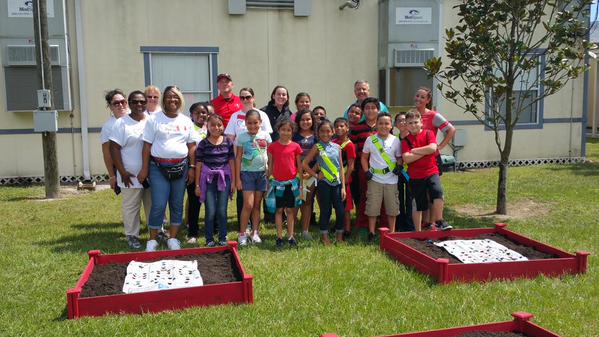
Schools given the gardens are considered Title I schools, where at least 40% of students are enrolled in free and reduced lunch programs. Title one schools also may include many students that are migrant students, students with limited English proficiency, homeless students, students with disabilities, or any student in need.
Clinton McDonald, a defensive tackle for the Tampa Bay Bucs, said it was an opportunity to give back to the community and positively influence kids to eat healthy food.
“Kids see us doing something they aspire to do. We’re using our platform to do something positive,” said McDonald in a recent article.
Although funding for the continued maintenance of the garden has not been determined, the community’s dedicated volunteers, teachers, and students plan to keep the learning gardens growing.
The teachers at Mort Elementary plan to incorporate learning curriculum that is focused on science and math with a healthy eating component for the future. They also plan to bring in the fifth-grade classes into the garden projects as well.
They hope to harvest the garden soon, Mueller said.
“It’s definitely important for them to learn things like that at an early age so they can start taking care of themselves now and know the importance of that so it becomes good habit as they grow older,” said Michael Johnson, a former Bucs player, in an article, “When they’re adults, they already have those good habits and they already know how to eat right and take care of themselves.”
Explore More:
Healthy FoodBy The Numbers
1
Supermarket
for every Latino neighborhood, compared to 3 for every non-Latino neighborhood
This success story was produced by Salud America! with support from the Robert Wood Johnson Foundation.
The stories are intended for educational and informative purposes. References to specific policymakers, individuals, schools, policies, or companies have been included solely to advance these purposes and do not constitute an endorsement, sponsorship, or recommendation. Stories are based on and told by real community members and are the opinions and views of the individuals whose stories are told. Organization and activities described were not supported by Salud America! or the Robert Wood Johnson Foundation and do not necessarily represent the views of Salud America! or the Robert Wood Johnson Foundation.



